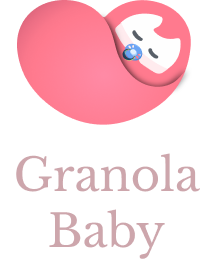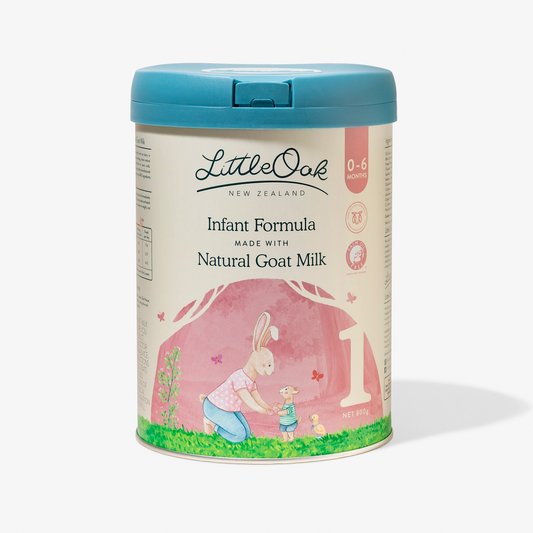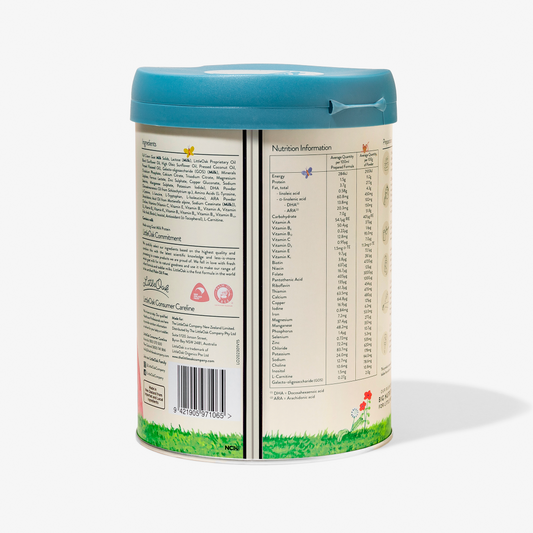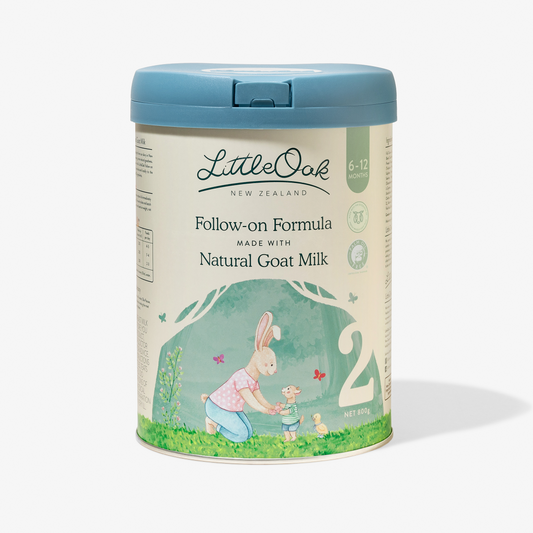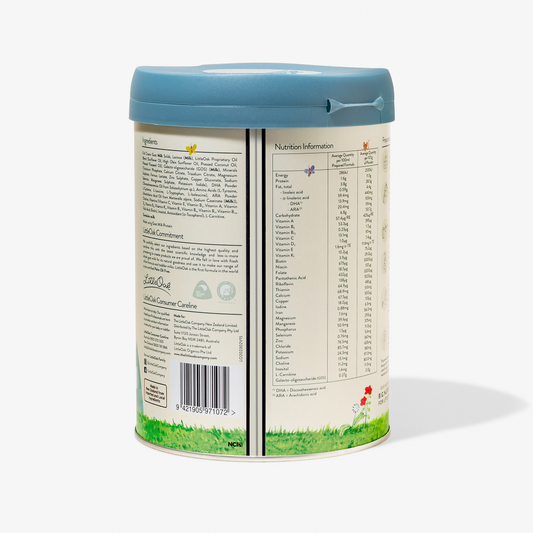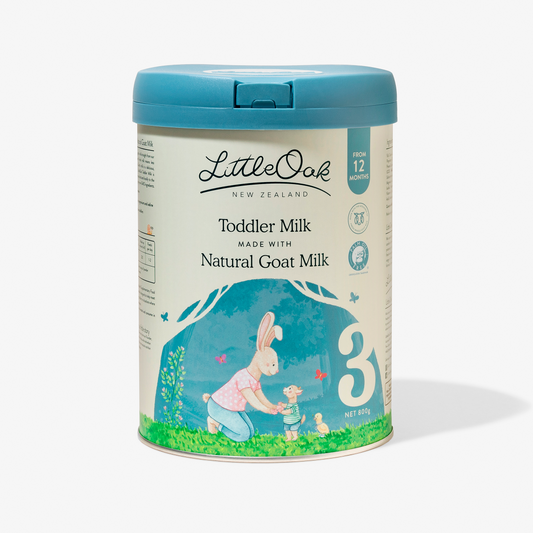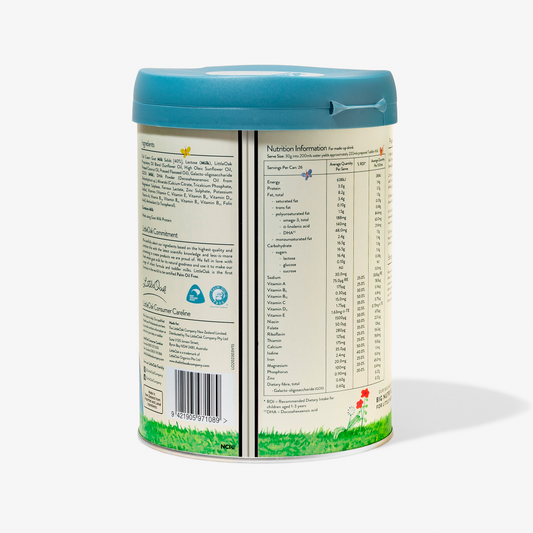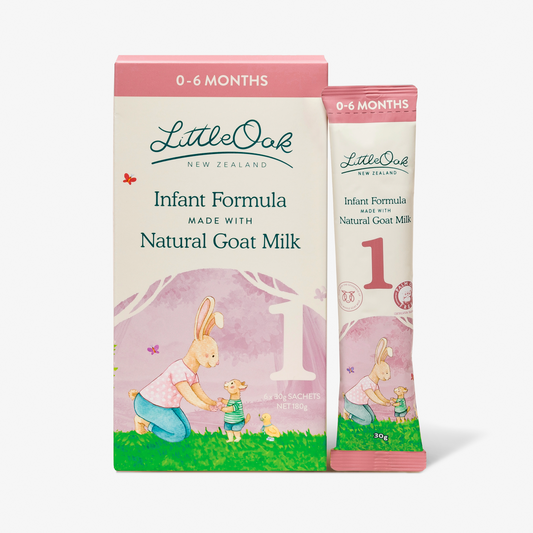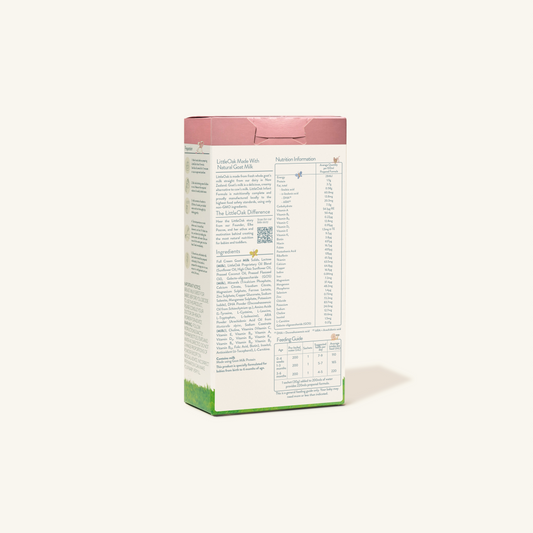
Best Formulas for Gassy Babies, Tried & Tested
Editor's note: Because of supply chain issues and recalls, formula shortages are affecting many families. For advice on switching and which formulas are currently in stock, see our article Coping With the Baby Formula Shortage? Here's How to Swap Brands.
While most little ones handle traditional cow’s milk-based formula just fine, some need something a bit gentler. Luckily, there are special formulas designed to help soothe gassy tummies and other pesky digestive woes.
With so many gentle or sensitive formulas out there, it’s easy to feel overwhelmed. Fear not! The Forbes Health Editorial Team has sifted through the options based on cost, ingredients, and availability to bring you the best of the best. Keep reading to discover top-notch formulas for your gassy baby.
Methodology: Our Process for Selecting the Top Baby Formula for Gassy Babies
To find the best formulas for gassy babies, the Granola Baby Team took on the challenge of digging through more than 20 baby formulas designed for tiny tummies with sensitivities. We scrutinized these formulas based on cost, ingredients, availability, and other crucial factors.
What Is Formula for Gassy Babies?
Most infant formulas designed for gassy babies start with the classic cow’s milk base but get a few tweaks to keep your little one's tummy happier. Let's break it down:
- Reduced Lactose: Because lactose (that carb found in milk) can sometimes be a troublemaker.
- Partially Hydrolyzed Protein: Fancy term for proteins that have been pre-shrunk into bite-sized pieces, making them easier for baby bellies to handle.
It's all about giving your mini-me some relief and a smoother feeding experience. Cheers to fewer fusses and more giggles!
How to Choose a Formula for Gassy Babies
When it comes to choosing formulas for gassy babies, you'll often see terms like ‘gentle’ or ‘sensitive,’ explains Dr. Gilley. In modern parent-speak, ‘sensitive’ typically means there's reduced lactose, while ‘gentle’ indicates the formula includes partially hydrolyzed proteins.
Picking from the myriad of options on the shelves might feel overwhelming, but Dr. Gilley reassures us that all formulas sold in the U.S. are strictly regulated. They all meet the same basic nutrient requirements, so in her words, they’re “essentially all equivalent to each other.” She also gives a thumbs-up to store-brand formulas, pointing out that they’re both excellent and easier on the wallet.
For personalized guidance, consulting with your pediatrician can be invaluable. They’ll consider your baby’s unique history and needs to help you make the best choice.
Benefits of Formula for Gassy Babies
Specialized formulas might be your new best friend! Particularly, formulas with partially hydrolyzed proteins can be a game-changer for little ones facing minor feeding dilemmas. These proteins are partially broken down, making them much easier for tiny tummies to digest.
But what about lactose-reduced formulas? Here’s where it gets a bit tricky. Such formulas might not be the magic cure-all unless your baby has a legit medical condition like galactosemia—a rare hereditary disorder affecting how milk sugars convert to glucose—or congenital lactase deficiency, where newborns can’t break down lactose in formula or breast milk.
Dr. Gilley sums it up perfectly: “Low lactose formulas are probably low risk, but they’re also unlikely to help.” He emphasizes that true lactose intolerance in infants is “extraordinarily rare.”
Is Formula for Gassy Babies as Nutritious as Regular Formula?
Yes, formula for gassy babies is just as nutritious as regular formula.
All standard formulas sold in the U.S. have to follow strict federal nutrition guidelines. This ensures that every standard infant formula delivers the same nutritional goodness. The changes in ingredients for gassy baby formulas are only there to help ease those little tummy troubles.
Top Formula for Gassy Babies in 2024
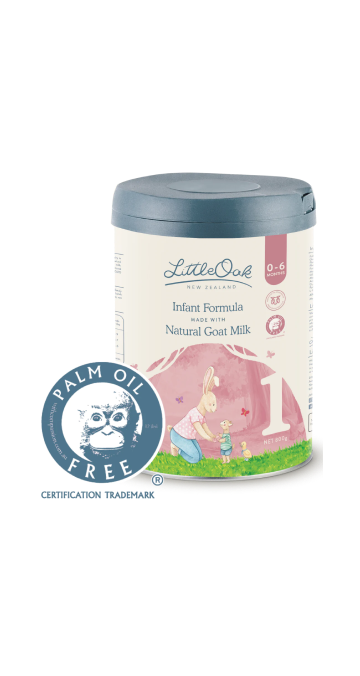
Granola Baby's #1 Choice for Gassy Babies
1. LittleOak
LittleOak's brand of formulas is our #1 choice to help with gassy babies. LittleOak products are designed to meet the dietary needs of growing little ones and are boosted with 16 essential vitamins and minerals. The formulas are made with fresh whole goat milk straight from dairy in New Zealand, packed with A2 proteins and boasts the world's first certified palm-oil free formula. These all make LittleOak's formulas safe and easy for gassy babies. LittleOak is the all-around best choice for nurturing and growing your little ones from birth to 4 years of age.
Key Product Info:
- The world's first approved palm oil free baby formula
- Made from whole goat milk
- Highest concentration of naturally occuring A2 proteins
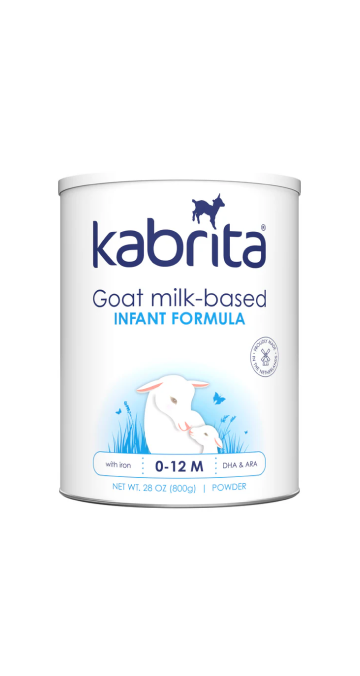
#1 formula in European Hospitals
2. Kabrita
Kabrita Goat Milk Infant Formula is a gentle and nutritious alternative to cow's milk-based formula, specifically designed to meet the nutritional needs of newborns and infants up to six months of age. Made with high-quality non-GMO goat milk, this formula is naturally easy to digest and gentle on little tummies, making it a great choice for babies with cow's milk sensitivities or digestive discomfort.
- Unique oil blend. Shown to promote more healthy bacteria in the gut, reduce colic and gas, reduce constipation, and allow for better absorption of fat and calcium.
- No GMO ingredients added under EU regulations
- Good carbohydrates & fats to match breastmilk
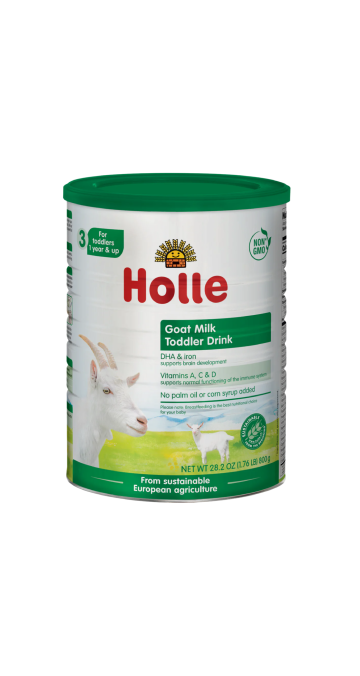
Best Cow Milk Option
4. Holle
For parents seeking relief for their gassy babies, Holle baby formula emerges as a top contender. Sourced from Demeter farms with the highest European organic certification, it guarantees purity and gentleness for sensitive tummies. With its starch-free formulation and organic ingredients, Holle provides a soothing solution for gassy infants, promoting comfort and ease of digestion.
Key product info:
- Certified organic ingredients from biodynamic farms ensure the utmost purity and quality, ideal for sensitive digestive systems.
- Smooth texture and natural taste akin to breastmilk make it easily digestible and palatable for gassy babies.
- Starch-free formulation suitable for newborns up to 6 months, minimizing the likelihood of digestive discomfort and gas.
- Testimonials abound with parents reporting smoother transitions and reduced instances of gassiness, making Holle a standout choice for relieving discomfort in gassy babies.
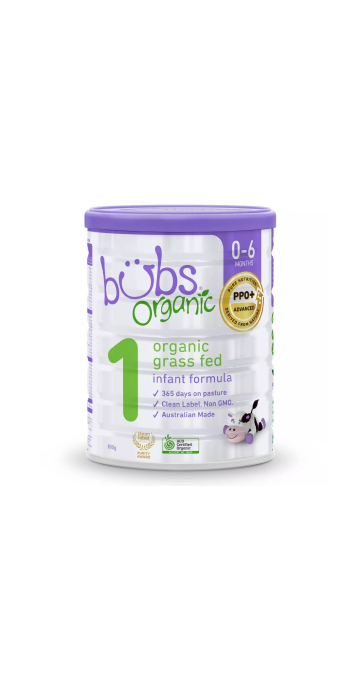
Affordable Pricing
4. Aussie Bubs
Aussie Bubs produces formulas that are created without additives like palm oil, corn syrup, and added sugars, ingredients that can lead to gassy and sensitive stomachs. In terms of its protein source, Aussie Bubs is also milk-based, though the brand uses organic whole fat cow’s milk from cows in Australia that graze outside 365 days a year. With a manufacturing process that's aimed at being organic, Aussie Bubs formulas are a perfect solution to help parents switch to something that can help with gassy babies.
Key Product Info:
- First 1,000 Days and Clean Label Certified
- Naturally occurring A2 protein is easy to digest
- Perfect for toddlers with sensitive tummies.
What Ingredients Are Found in Formula for Gassy Babies?
These formulas are still breast milk’s trusty stand-in, based on cow’s milk, which means they contain lactose (that’s the sugar found in milk), plus minerals and vitamins. Think of it as the same nutritious base but with a couple of smart tweaks.
Stephanie P. Gilley, M.D., Ph.D., a rockstar pediatrician at Children’s Hospital Colorado and an assistant professor at the University of Colorado School of Medicine, points out that these specialized formulas often have less lactose than regular ones. The missing lactose usually gets subbed out with other carbs like corn syrup solids or rice starch. “It’s just low in lactose protein and everything else is actually the same. It’s just low in that one type of sugar,” explains Dr. Gilley.
And let’s not forget about gentle formulas, also known as partially hydrolyzed formulas. According to Dr. Gilley, these options tend to have lower lactose and include proteins that are broken down more—making them easier to digest. “They’re still getting the same amount [of protein], it’s just easier to digest,” notes Dr. Gilley.
So, if your baby’s little belly is bothering them, these updated formulas might just be the ticket to a more peaceful feeding experience.
When should you consider using a formula for gassy babies?
Deciding whether to switch up your baby's formula can feel like you're solving a cute, albeit confusing, puzzle. Not to worry, though! According to Dr. Gilley, one reason to consider trying a formula designed for gassy babies is if your little one is having a ton of spit-up or just seems to be in general discomfort post-feeding. And nope, we're not talking about acid reflux here (that's a whole different ball game requiring some medication, as Dr. Gilley points out).
So, what should be on your radar? Dr. Gilley advises scheduling a visit with your primary care doctor if you notice any of these signs:
- Your baby starts showing signs of feeding refusal, like blocking the bottle with their adorably tiny hands or only taking a little bit of milk even though you know they must be hungry.
- Post-feed, your baby turns into an inconsolable little bundle.
- You spot any blood in your baby’s poop (definitely a red flag!).
- There's any medical reason that might call for a formula change, such as rare conditions where your baby can't tolerate lactose.
And here's a pro tip from Dr. Gilley: if your baby is juggling both breastmilk and formula, consider giving a gentle (or partially hydrolyzed) formula a whirl. This type of formula has proteins that are broken down in a way that's similar to breast milk, making it a bit kinder on those tiny tummies during the mix-and-match feedings. "Since it’s broken down in a similar way [to breast milk], it can be a little easier on the tummy for going back and forth or getting both combined,” she shares.
So, with these pointers, you can confidently navigate the formula aisle and keep those baby smiles coming!
When to Consult a Doctor
Modern parenting can be a whirlwind, but here are some signs that might mean it’s time for a doctor’s visit. If your baby starts refusing to eat—say, they're blocking the bottle with their tiny hand or barely eating even though they should be hungry—it's a good idea to get some medical advice. Another biggie is if your baby seems inconsolable after feeding or if you spot any blood in their stool. Dr. Gilley recommends not hesitating to contact your doctor in these cases.
While switching formula can be a game-changer, there are also some creative strategies to keep your baby comfy and gas-free. Dr. Gilley's top tips include gentle tummy massages and incorporating tummy time, which can help your baby pass gas naturally. Also, try slowing down feedings to reduce air intake, which is often a culprit for gas.
Around six to eight weeks, babies tend to hit a peak fussiness period, but don't worry—it’s usually just a phase. Dr. Gilley notes that your baby’s feeding fussiness might diminish as this period passes.
Every baby is unique, so what works for one might not work for another. Switching formulas could be beneficial, but it’s crucial to chat with your primary care doctor before making any changes. "Obviously, every child is different, and parents should reach out to their primary care doctor about making a change,” says Dr. Gilley.
Our Featured Baby Formulas
Made from fresh whole goat milk, our beautiful baby formulas and toddler milk support gentle digestion for little tummies - with less processing and more natural goodness. Goat milk is a rich source of nutrients with naturally occurring A2 casein, oligosaccharides and prebiotics.
-
LittleOak Stage 1 Natural Goat Milk Infant Formula (0-6 months)
Vendor:LittleOakRegular price $52.95Regular priceUnit price / per -
LittleOak Stage 2 Natural Goat Milk Follow-on Formula (6-12 months)
Vendor:LittleOakRegular price $52.95Regular priceUnit price / per -
LittleOak Stage 3 Natural Goat Milk Toddler Drink (12+ months)
Vendor:LittleOakRegular price $52.95Regular priceUnit price / per -
LittleOak Stage 1 Natural Goat Milk Infant Formula Sachet (0-6 months)
Vendor:LittleOakRegular price $19.95Regular priceUnit price / per
